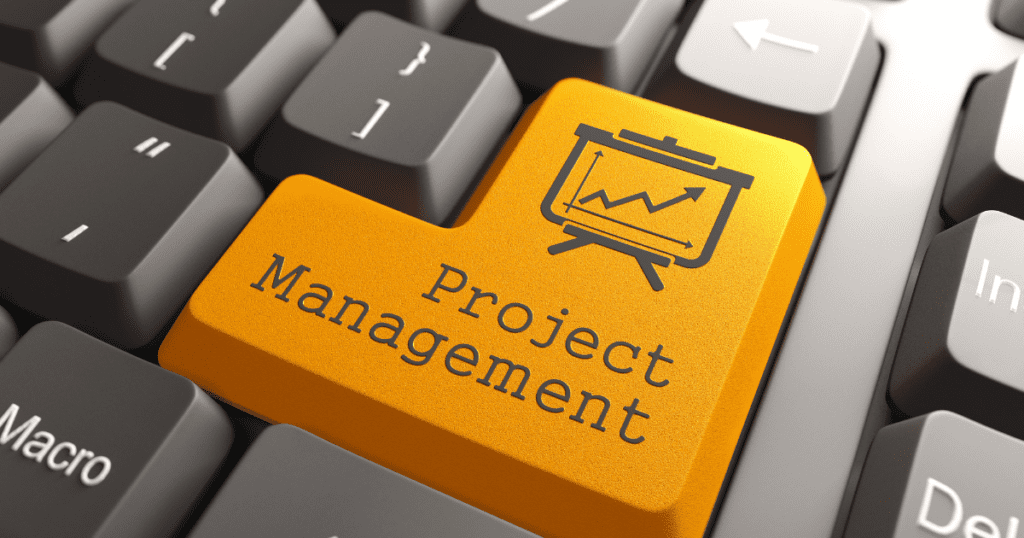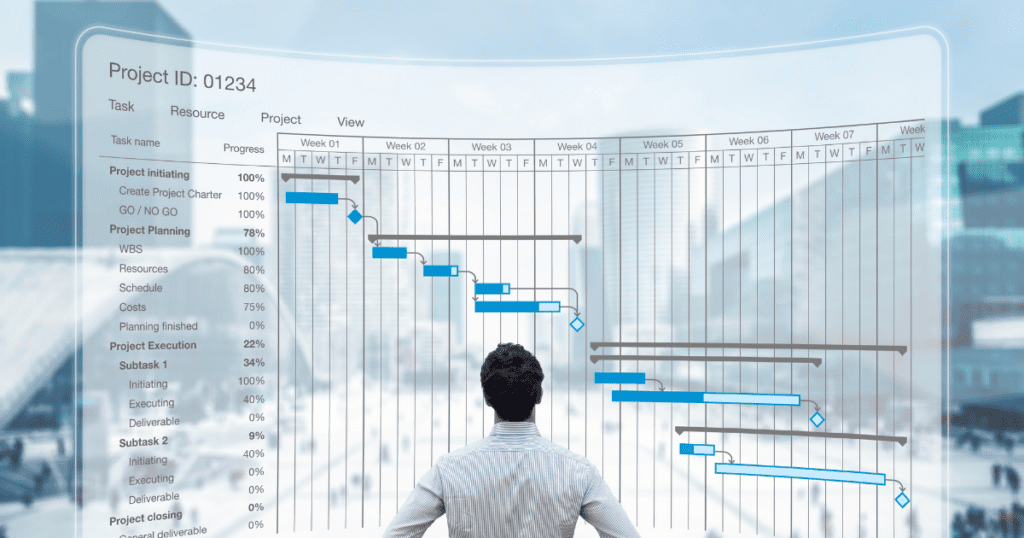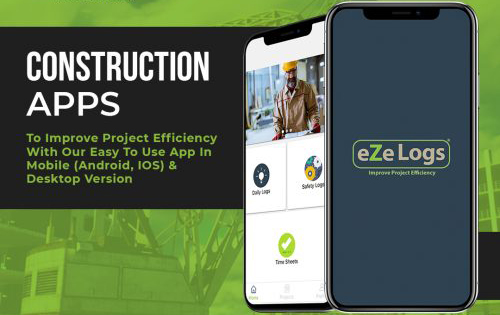Project management is an essential tool for successful construction projects. It helps to ensure that projects are completed on time, within budget, and to the highest quality standards.

Project management in construction projects can be used to plan, organize, and control the various aspects of a project, from the initial concept to the final completion. It can also be used to monitor progress, identify potential risks, and ensure that all stakeholders are kept informed. The following are five applications of project management in construction projects:
1. Scheduling: Project management can be used to create a detailed timeline for the project, including milestones, deadlines, and resource allocation. This helps to ensure that the project is completed on time and within budget.
2. Cost Estimation: Project management can be used to accurately estimate the cost of a project, including materials, labor, and other expenses. This helps to ensure that the project is completed within budget.
3. Risk Management: Project management can be used to identify potential risks and develop strategies to mitigate them. This helps to ensure that the project is completed without any major issues.
4. Quality Control: Project management can be used to ensure that the project is completed to the highest quality standards. This helps to ensure that the project meets the expectations of all stakeholders.
5. Communication: Project management can be used to ensure that all stakeholders are kept informed throughout the project. This helps to ensure that everyone is on the same page and that any issues are addressed quickly.
Applications of Project Management: Planning and Scheduling
Planning and scheduling are essential components of any successful project. They help to ensure that tasks are completed on time and within budget.
When planning a project, it is important to consider the scope of the project, the resources available, and the timeline. It is also important to consider any potential risks and how to mitigate them. Once the project plan is in place, it is time to create a schedule.
The schedule should include all tasks that need to be completed, the resources required to complete them, and the timeline for each task. It is important to be realistic when creating the schedule and to allow for some flexibility.
Once the schedule is in place, it is important to monitor progress and make adjustments as needed. This can be done by tracking progress against the timeline and making changes as needed.
Planning and scheduling are essential components of any successful project. By taking the time to plan and create a schedule, you can ensure that your project is completed on time and within budget.
Resource Management
Resource management is an important part of any successful business. It involves the efficient and effective use of resources to achieve organizational goals. This includes the management of people, money, materials, technology, and other resources.
Good resource management is essential for businesses to remain competitive and successful. It helps to ensure that resources are used in the most efficient and effective way possible. This can help to reduce costs, increase productivity, and improve customer satisfaction.
Resource management involves a number of different activities. These include planning, organizing, controlling, and monitoring resources. It also involves setting goals and objectives, developing strategies, and evaluating performance.
Resource management requires strong leadership and communication skills. It is important to be able to effectively communicate with all stakeholders, including employees, customers, suppliers, and other partners. It is also important to be able to effectively manage resources in order to achieve organizational goals.
Resource management is an ongoing process. It requires constant monitoring and evaluation to ensure that resources are being used in the most efficient and effective way possible. It is important to be able to identify areas of improvement and make necessary changes in order to remain competitive and successful.
Quality Control
At ABC Company, we take quality control seriously. Our team of experts is dedicated to ensuring that all of our products meet the highest standards of quality. We use a variety of methods to ensure that our products are safe, reliable, and of the highest quality.
First, we use a rigorous testing process to ensure that all of our products meet our standards. We test each product for safety, reliability, and performance. We also inspect each product for any defects or inconsistencies. If any issues are found, we take immediate action to correct them.
Second, we use a comprehensive quality assurance system to ensure that all of our products are up to our standards. We use a variety of tools and techniques to ensure that our products are safe, reliable, and of the highest quality.
Finally, we use customer feedback to ensure that our products are meeting our customers’ expectations. We take customer feedback seriously and use it to make improvements to our products.
At ABC Company, we are committed to providing our customers with the highest quality products. We take quality control seriously and use a variety of methods to ensure that our products meet our standards.
Risk Management
Risk management is an important part of any business. It involves identifying, assessing, and controlling potential risks that could have a negative impact on the organization. By taking proactive steps to manage risk, businesses can protect their assets, minimize losses, and maximize profits.
At its core, risk management is about understanding the potential risks that could affect your business and taking steps to mitigate them. This includes identifying the risks, assessing their potential impact, and developing strategies to reduce or eliminate them.
Risk management is a continuous process that requires ongoing monitoring and review. It is important to regularly review your risk management plan to ensure that it is up to date and that any changes in the business environment are taken into account.
Risk management is a complex process that requires a thorough understanding of the business and its operations. It is important to have a team of experienced professionals who can help you identify and assess risks, develop strategies to mitigate them, and monitor their effectiveness.
By taking proactive steps to manage risk, businesses can protect their assets, minimize losses, and maximize profits. Risk management is an essential part of any successful business and should be taken seriously.
Communication and Collaboration
Good communication and collaboration are essential for any successful team. By working together, teams can achieve more than they could on their own.
To ensure effective communication and collaboration, it is important to establish clear expectations and guidelines. This includes setting up a system for communication, such as a shared chat platform or email list, and agreeing on a style of communication that is both professional and friendly.

It is also important to ensure that everyone is on the same page when it comes to tasks and deadlines. Establishing a timeline for each project and assigning tasks to specific team members can help ensure that everyone is working towards the same goal.
Finally, it is important to foster an environment of trust and respect. This means listening to each other’s ideas and opinions, and being open to feedback. By creating an atmosphere of collaboration, teams can work together more effectively and efficiently.
By following these guidelines, teams can ensure that their communication and collaboration are effective and productive.
The Bottom Line
Project management in construction projects is an invaluable tool for ensuring successful outcomes. It can be used to plan, organize, and control the various aspects of a construction project, from budgeting and scheduling to resource allocation and quality control.
Project management can also help to identify potential risks and develop strategies to mitigate them. By utilizing the five applications of project management in construction projects, project managers can ensure that their projects are completed on time, within budget, and with the highest quality standards.


